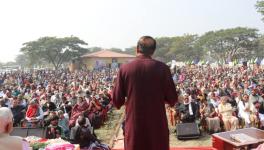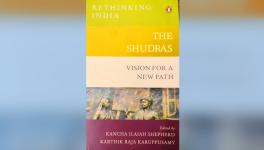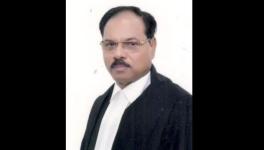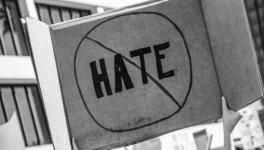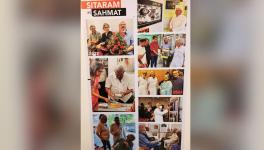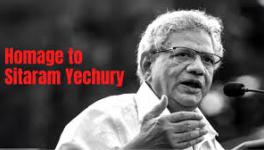‘The Struggle for Larger Azadi has Never Been More Urgent than it is Today’
Representational use only.
As India celebrates 75 years of Independence this year, there is a need to renew the urge to end oppression which has taken mammoth proportions in every sphere of life, says eminent historian Tanika Sarkar. In an interview with Sahba Husain, the well-known historian of modern India says while the country’s Independence from colonial rule was indeed a landmark event, but azadi or freedom is a continuous project, an incomplete mission, as long as there is repression, exploitation, discrimination in the country. Edited Excerpts:
ICF: This year, the country is celebrating 75 years of India’s Independence. Please share with us your thoughts on the significance of these celebrations, given the current political climate in the country.
TS: Independence from colonial rule was no doubt a landmark event in our history. I would say that it was so even for world history because Indian independence was the result of some of the largest mass movements the world has ever seen. More importantly, the entire phase of freedom struggles had unleashed desires for various other kinds of freedom -- for dalits, workers, peasants, adivasis, women – in short, for all manner of subaltern people. Those freedom struggles were no less important than decolonisation.
Unfortunately, the State and also large parts of mainstream society assume that freedom has been fully accomplished after the British left and political sovereignty was all that we were striving for. Azadi, however, is a continuous project, an incomplete mission, as long as there is repression, exploitation, discrimination in the country.
I find it amazing that we routinely celebrate nationalist heroes who had engaged in uncompromising public criticism of colonial policies, in massive upsurges of protest, but if these methods are repeated today, we condemn them as terrorism, as anti-national conspiracies. Where is it written that we must simply obey State orders and leave critical scrutiny of the State of the country to our rulers once the nation-state becomes sovereign and independent?
In fact, the struggle for the larger azadi has never been more urgent than it is today. If Independence Day celebrations should mean anything, they should renew the urge to end oppression which has taken mammoth proportions in every sphere of life. The superrich are wealthy beyond imagination and the
poorest have plunged into the lowest depths of poverty in the last five years.
Atrocities against minorities and dalits, spectacular violence against women, not only persist but have intensified and the State no longer makes even gestural efforts to curb them. Every criticism carries the potential of being branded as Naxalism or terrorism. This is not what 75 years of Independence should have led us to.
How would you define India at 75? What, according to you, are the landmark moments that shaped India in its journey since Independence?
When we think of the Nehruvian era – or even of subsequent Congress rule -- we think in terms of the Constitution, the Bandung Conference, Indian support to African and South Asian liberation struggles, the internationalism that still survives in some of our street names. We think of state support for Palestinians, for victims of South African apartheid. We think of the legal abolition of untouchability and gender reforms for Hindus. We think of the magnificent achievement of holding elections based on universal adult franchise in a country with a most inadequate communication network and a bureaucracy as yet unused to such an exercise.
And all this was achieved despite the scars of Partition and the massive influx of refugees who had to be accommodated by a state structure that had barely begun to function. We think of a planned economy, fairly rapid industrialisation, and the growth of a public sector which ensured some rights for workers , as also of bank nationalisation, land reforms, of Privy Purse and zamindari abolition. We celebrate our support to the Bangladesh Liberation War.
All these are significant achievements and should be celebrated. But under pressure of relentless repression today, we sometimes tend to forget the darker side of the picture. Industrialisation and big dams drove countless poor people out of their land, homes and livelihood. Abolition of untouchability has been on paper and atrocities against dalits have grown over the years. Sedition laws were intensified and new draconian laws, like the AFSPA (Armed Forces Special Powers Act) and the UAPA (Unlawful Activities Prevention Act), entered governance. The promised plebiscite in Kashmir was never held with disastrous consequences for Kashmiri people and the process of integration of Princely States into India sometimes involved brutal force. Communal riots continued though, unlike more recent times, the State did try to quell them earlier.
Over the years, land acquisition from farmers has enabled massive displacement, especially of adivasis, and environmental safeguards are steadily lowered, resulting in grave damage to the environment. Above all, the Emergency time dictatorship and the genocidal violence against Sikhs should never be forgotten for a moment. The women’s movement has fought hard to wrest at least some legal rights from the State but many of them have not been translated into practice. India remains one of the most illiterate countries 75 years after Independence.
What about the constitutional guarantees and promise of equality for all, irrespective of caste, class, religion and gender? What are the reasons, according to you, for the continuing (institutional and social) discrimination based on these ‘categories’?
Class inequalities have actually assumed frightening proportions as we open up our land and labour to multinational as well as indigenous capitalists. Trade union rights are steadily eroded. As for gender, caste and religious discrimination, I would say that these are such deeply ingrained cultural values and we need continuous and creative forms of struggle and education to eradicate them.
In recent times, however, even reporting on abuses of dalits, women and minorities has become a threatened and dangerous matter and the scope for change is steadily diminishing. The real backlash is in the sphere of religious discrimination. We are now, for all practical purposes, a Hindu nation.
Has the status of minorities and women in India improved in any significant manner in the decades since Independence? What are the main challenges confronting them today?
I would say that the status of the minorities has declined alarmingly. As for women, the growth of feminist politics did lead to certain positive changes and we should not underestimate them. But, more change is urgently necessary -- for protection against state atrocities, from patriarchal cultural values which can assume a very modern and seemingly progressive guise but which can subordinate women as mercilessly as traditional norms, the ad culture or media discourses, for instance.
The current controversy about marital rape shows how deep-seated the notion of husbandly control is. The so-called anti-Love Jihad campaigns threaten to close down the exercise of freely chosen love and marriage among interfaith partners, just as the Nuremberg laws of Nazi Germany did in the 1930s.
You have also written books on women and the rise of the Right wing in India in the 90s. What are the implications/consequences for women’s political agency and for gender equality today, given the rise and consolidation of the RSS/BJP?
I have written very critically about the role of women in communal organisations. But we also need to admit that Right wing organisations do deploy women in highly visible capacities. They have very innovative and subtle ways of capturing their allegiance, especially through an appeal to religion. In fact, they offer a deadly form of gender equality in violence which may partly compensate for women’s subordination in other spheres of life. We must admit, too, that other parties have not necessarily overcome gender prejudices and have perhaps accorded even less political prominence to their women.
I would call the gender ideology of the Hindu extremists a form of social conservatism, combined with a degree of political empowerment for women from their ranks alone. It is not yet fully fundamentalist but may soon go that way. In fact, women’s organisations should demand that the Bharatiya Janata Party discloses their blueprint for the Uniform Civil Code for public debates before they suddenly inflict it on us.
Words such as citizenship, democracy, nationalism, secularism, freedom and justice seem to have acquired new meaning in recent years. So have dissent and resistance. What are your thoughts on this and on the (changing) character of the Indian State?
The answer is short -- these spell the death of democracy. The accepted meanings of each and every one of these terms have been inverted and made a mockery of.
Your active commitment to the civil and democratic rights movement as well as the women’s movement in the country is known. Please share with us your understanding of these struggles over the years and lessons learnt/to be learnt.
It is a matter of enormous pain and grief to me that so many comrades from whom I have learnt how to engage in struggles for peace and secularism are now in jail for an indefinite time and under merciless conditions. Students with whom I loved to argue and learn from, now face blighted careers which were very promising, an end to meaningful activism and terrifying incarceration.
I remember how, in the aftermath of the Babri Mosque demolition, some of us met together to set up the People’s Movement for Secularism under Gautam Navlakha’s direction, how we went into all kinds of neighbourhoods, colleges and schools to talk about peace, how we held school- level discussions with students and teachers on burning issues of the day and carried those discussions to the colleges and universities where we taught. We read Anand Teltumbde to understand caste in contemporary times which encouraged Sumit (historian Sumit Sarkar) to teach a course on caste at Delhi University. Later, I, too, offered a course at JNU. I remember a very young Sudha Bharadwaj visiting our home many times and holding us enthralled with a description of her work with the Chhattisgarh Mukti Morcha. Will those days ever come back?
The 75-year celebrations have coincided with the pandemic and consequent lockdowns since 2020, which caused immense suffering and hardship to people - particularly women and marginalised groups. What are your thoughts on people’s aspirations and access to education, health and livelihood, given the situation?
I think I have already answered that. The pandemic simply illustrated as never before the utter callousness of the authorities toward the poor and labouring people. I do not think that the Central government even disclosed how the funds they raised for relief were spent. And they punished journalists who exposed the real picture of suffering.
Do you have any memories from childhood and your growing up years in Calcutta with reference to the freedom struggle?
In our childhood, we were taught about the idealism and sacrifices of freedom fighters -- but in such a non-analytical and uncritical manner that we did not know that there were serious differences or contradictions among them. They were all great men – occasionally women – and they made India free. We were never told about the anti-colonial struggles of ordinary people.
The narrative was meant to be uplifting but usually it was so routinised that it got to be a boring ritual. I remember that year after year we heard that Netaji (Subhas Chandra Bose) will come back and deliver India from all her problems. Interestingly, Calcutta had no fondness for Gandhi. The horrors of Partition were not publicly acknowledged but tales of so-called Muslim betrayal and violence kept alive a simmering communalism in families of many friends.
There are also childhood memories of police attacks and shootings upon unarmed workers demanding a bit of wage increase. The fifties and the sixties saw recurrent rioting in Calcutta. I vividly recall the 1964 riot which most of my school friends attributed to Muslim wrongdoing. But I watched some attacks on helpless Muslims -- an old Imam of a neighbourhood mosque being beaten up ruthlessly by neighbourhood boys, the burning of an old mosque in the Ballygunge Lakes, a Muslim man running to find shelter in a speeding tramcar, chased by a mob. This suddenly made me see many of my friends and neighbours in a new light.
I now thank my stars that I belonged to a very secular and progressive family and my parents had an interfaith marriage. Otherwise, I too may have succumbed to the toxic hatred which, obviously, lurked under an otherwise cultured and sober Calcutta environment.
Of course, there were exceptions, too, and Calcutta also had a very vibrant and strong secular ethos alongside that. But communalism never went away and we sometimes came across RSS (Rashtriya Swayamsevak Sangh) schools and shakhas which quietly and patiently carried on with their work.
Get the latest reports & analysis with people's perspective on Protests, movements & deep analytical videos, discussions of the current affairs in your Telegram app. Subscribe to NewsClick's Telegram channel & get Real-Time updates on stories, as they get published on our website.









